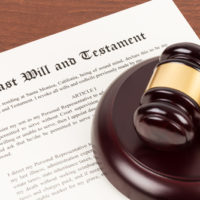Revoking A Will In Florida

Writing a will is an important part of estate planning. Depending on the assets owned, a will can be written easily and as long as it meets the legal requirements under Florida law, it will be valid. However, as life changes, a person who writes a will may want to make certain changes in the will’s provisions in order to take care of changed circumstances.
There are several ways to amend or revoke a will in Florida. One way in which a will can be revoked is through the writing of another will. If a person writes a new will that contradicts terms in an older will, the new will can revoke the older will. This is true even if the new will does not expressly state that it is being written with the purpose of revoking another will. When the new will does not state that it is supposed to revoke an older will, it only revokes the terms of the older will that it changes. If the new will expressly states that it is written with the intention to revoke all prior wills, then it serves as a revocation of all the terms of a prior will.
Wills can also be revoked by a physical act of destruction. This means that the person who writes the will may decide to destroy the will by burning it, tearing it apart, or taking any other action that destroys the will physically. If this destruction of the will is witnessed by others, it does not matter if someone else holds a copy of the destroyed original will. The copy will not be probated in place of the destroyed original because the will is considered revoked. The destruction of the will does not have to be witnessed for the revocation to be valid.
It is possible for a person who intends to revoke a will to ask or order another person to take care of the destruction. However, the person whose will is being destroyed has to be in the room when the destruction takes place. If the person who is revoking the will by asking another person to destroy it fails to witness the destruction, the will is not legally revoked.
If a person has written previous wills, the act of destroying the will or revoking it has the effect of reviving the older wills. It is therefore important to make sure that when you are destroying or otherwise revoking a will, any prior wills are properly revoked and will not survive as the last will and testament. It is also important to know that changes such as marriage or the birth of children after a will is written do not revoke or amend the will. If new provisions in the will are required, it is important to make these changes with an experienced attorney.
Contact Us for Legal Assistance
Whether you are thinking of writing your first will, or considering making changes to an existing will, you should consult with an experienced estate planning attorney to ensure that you satisfy the legal requirements of a valid will. For more information, contact an experienced estate planning attorney from the Millhorn Elder Law Planning Group located in The Villages, Florida.
Resource:
leg.state.fl.us/Statutes/index.cfm?App_mode=Display_Statute&Search_String=&URL=0700-0799/0732/Sections/0732.505.html


